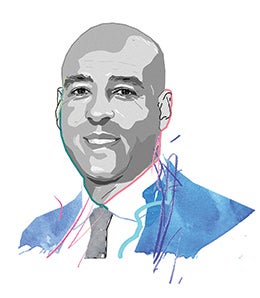Here’s to ‘Formalized Curiosity’
A Note from President Reginald DesRoches

Summer 2023
By Reginald DesRoches
The great American author and anthropologist Zora Neale Hurston wrote, “Research is formalized curiosity. It is poking and prying with a purpose.”
My colleagues and I know what Hurston is talking about. It was this unquenchable curiosity and desire to advance humanity that led me, after witnessing the damage wrought by the 1989 Loma Prieta earthquake, to pursue a doctorate in structural engineering. I then devoted my research to improving earthquake resilience around the world.
Teaching, research and scholarly endeavors across all disciplines are what we do at Rice. Over the course of our 111-year history, we have established ourselves as one of the leading academic institutions in the world.
Research is essential to great universities. In addition to fueling the creation of knowledge, driving innovation, enriching education, attracting talent and building reputation, research enables universities to fulfill their roles as critical thinkers, generators of new ideas and contributors to the betterment of the world. Research also enhances undergraduate education, especially at Rice, where the majority of our undergraduates are involved in research and all our students pursue the creative and systematic practice of discovery.
Rice made a commitment to doing impactful research early on. Just six years after opening its doors, Rice awarded its first doctoral degree. Today, graduate students make up almost half the university’s student population. Rice’s funded research has grown significantly over the years as well. Scholars at Rice conduct research in a range of critical areas that cross numerous disciplines in all our acclaimed schools and departments. Following are just a few examples.
Focusing our efforts on solving the big problems of our lifetime — energy and climate, social and economic disparities, health and medicine, and information science — is how we can make the biggest impact.
Rice professors Naomi Halas and Peter Nordlander led the development of a new type of commercially viable photocatalyst that only needs the power of light to make the hydrogen economy a reality. Their invention has been licensed by Syzygy Plasmonics, a Houston-based startup company, and is making its way to the marketplace.
In the area of global health, professors Rebecca Richards-Kortum and Maria Oden apply their research through NEST360, an international partnership of engineers, doctors and public health experts who aim to end preventable newborn deaths in African hospitals.
Finally, Rice anthropologists Mary Prendergast and Jeffrey Fleisher recently gained international attention for their genetic research that revealed that medieval people who lived along the Indian Ocean coast of eastern Africa had both African and Persian ancestry, suggesting that maritime trade connections fostered relationships between Asian merchants and African traders and their families.
As you can see, Rice’s research enterprise is thriving, and our faculty is embracing the challenge of taking our endeavors to the next level. Elevating our research profile and the impact of our research is one of my primary goals as president. Focusing our efforts on solving the big problems of our lifetime — energy and climate, social and economic disparities, health and medicine, and information science — is how we can make the biggest impact. Partnering with world-leading organizations and institutions in Houston, such as the Texas Medical Center and Johnson Space Center, and leveraging the living laboratory that is the city of Houston are key to our success.
In the coming years, we will make additional investments to support our research mission. Vice President for Research Ramamoorthy Ramesh will soon announce several new institutes and centers that will serve as focal points for research activities that span disciplines, and Vice President for Innovation Paul Cherukuri has hit the ground running in our efforts to build programs that help our faculty and students successfully commercialize their technologies.
Rice will reach new heights of excellence and impact through research and innovation. Our research and scholarship will help solve some of the world’s most pressing problems while working to ensure that all communities share the benefits equally. This is our responsibility as a member of a now-global and interconnected community of learners, educators and researchers.
